Event Reports
Research Integrity Symposium "Toward Development of Responsible Research and Innovation" (17 Nov '23)
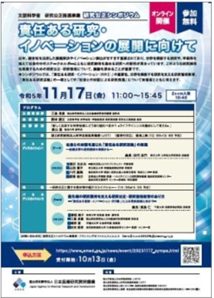
This report covers the keynote speech, as well as panel discussion 2, "Research Integrity and Research Ethics Education to Support Cutting-Edge Research and Development."
Keynote speech: How should we Tackle Newly Emerging Science and Technology? ― Thinking about Life Science
Professor Yutaka Hishiyama, Vice President of the Tokushima University
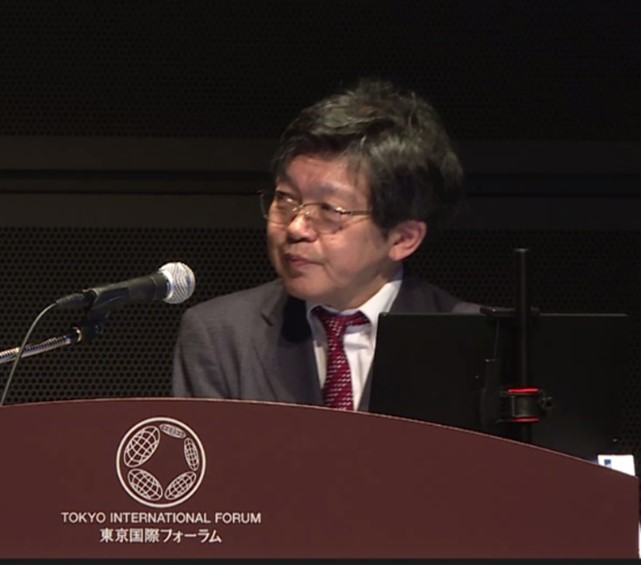
After explaining the definition of RRI (https://rri-practice.eu/about-rri-practice/what-is-rri/), he stated that the system needs to be re-formulated and those who are responsible need to engage in ethical and sustainable innovation. He then introduced the JST Center for Research and Development Strategy report, "Transformation of Science, Technology and Innovation from ELSI to RRI," and emphasized the importance of evaluating not only the Mission Oriented Innovation Policy (MOIP) but also the history and background in various academic fields.
In his concluding remarks, Prof. Hishiyama stated that with the emergence of new scientific technologies such as synthetic biology, Brain Machine Interface (BMI), quantum technology, AI, and automated driving, advanced countries are faced with the challenge of dealing with these technologies and how to effectively utilize them in society. He stated that it is difficult to set rules in advance, but it is important to consider when to set rules for AI and genome editing, and that the governance of science and technology requires the use of comprehensive knowledge that draws on experience and brings together various kinds of wisdom.
Panel Discussion 2: Research Integrity and Research Ethics Education to Support Cutting-Edge Research and Development―Toward Promoting Research through "Responsible Research and Innovation (RRI)"
Chair: Associate Professor Jin Higashijima, Graduate School of Global and Transdisciplinary Studies, Chiba University
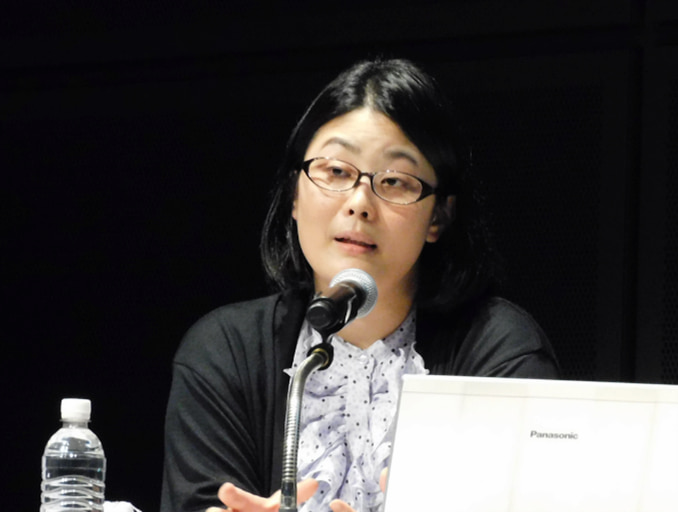
Assoc. prof. Higashijima stated that in proceeding with RRI, it is often considered troublesome to properly manage data to avoid suspicion of misconducts, but if we keep in mind the development of society and the next research, and store the data in an appropriate format for future use, we can benefit ourselves and conduct even more effective research.
Assoc. prof. Higashijima then mentioned that universities and research institutions that are currently conducting cutting-edge research and development as knowledge centers, as well as the need for trans-disciplinary research in the healthcare and public health field, such as that supported by AMED, and a fusion approach that transcends the boundaries of research fields. By collaborating with people who are aware of social issues and have appropriate knowledge of development, she said that "we can gain knowledge that will enable us to tackle that which is occurring in the real world and change future societies for the better."
"RRI and ELSI Initiatives at Universities―From Example Cases of Practice"
Professor Yuko Fujigaki, Executive Vice President of The University of Tokyo
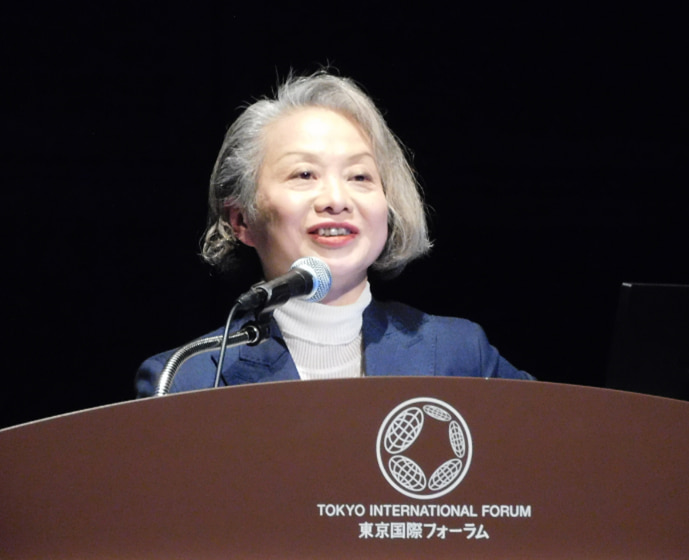
When focusing on research ethics and research misconduct, Prof. Fujigaki mentioned the importance of considering how research results affect society, not just "a collection of don'ts." The concepts of RRI and Ethical, Legal, and Social Imprecations (ELSI) promote this, and the University of Tokyo, based on the President's guidelines, has set "40 research ethics seminars a year incorporating RRI and ELSI" as an indicator and is promoting efforts in each department.
The importance of ELSI has increased since the 1980s due to discussions about the interaction between science and society; the concept of stakeholder involvement from the "Upstream" of the research process was added in the 2000s, and the concept of RRI has become widespread since the 2010s. Furthermore, the European Science and Technology Policy (Framework) Horizon 2020 emphasizes the importance of collaboration between social actors in the research and innovation process. Prof. Fujigaki introduced the three essences of RRI, which are to open discussions to many stakeholders, to develop mutual discussions, and to consider new institutionalization.
At the University of Tokyo, initiatives have been made to incorporate the RRI concept into the initiatives of each department. After holding seminars throughout the university, explanations were given to each department, and Good Practice was shared at the results presentation meeting attended by 45 departments. For example, the Graduate School of Frontier Sciences provides opportunities for its members to think and talk about what would happen if they incorporated RRI into their own research, and introduced an example case that is taking root as a course for students. Prof. Fujigaki pointed out that it is important for researchers to think about how to incorporate RRI into their own research as a person involved, rather than just hearing about it at seminars.
・Utokyo Compass
Perspectives from a Researcher in Humanities and Social Sciences Associate Professor Megumu Yokono, School of Social Sciences, Waseda University
Assoc. prof. Yokono spoke about her experience as a social science researcher who reviewed medical research ethics and ethical guidelines, as well as the status of the Certified Research Ethics Professional (CReP) certification system (Establishment of the Certified Research Ethics Professionals: An Ethical Review Expert).
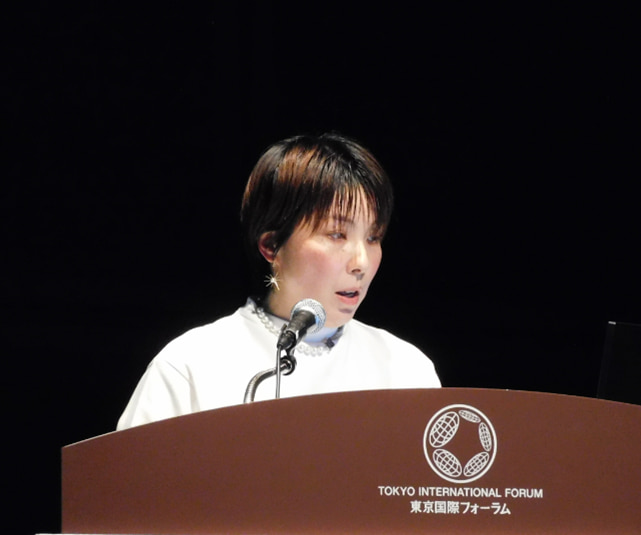
The CReP certification system is a professional certification system for ethics reviewers established as part of the Research and Development Program for Enhancement of Research Integrity supported by AMED. Assoc. prof. Yokono introduced her current project, which promotes networking among CRePs and the creation of educational materials, as an effort to build best practices through the exchange of opinions on issues at each institution and related trends such as the revision of guidelines.
Assoc. prof. Yokono concluded that "It is important for development of RRI that researchers experience changes in the regulatory environment and gain a better understanding of the significance of their own participation in the process of updating rules, including codes of ethics. At the practical level, discussions among diverse institutions would help ensure the credibility of the research."
Summary of the Panel Discussion
Together with Prof. Fujigaki and Assoc. prof. Yokono, the panel discussion was summarized by, Yoshinao Mishima (President of AMED) and Masayuki Yoshida (Professor of Tokyo Medical and Dental University).Prof. Fujigaki said, "Various initiatives were introduced at this symposium, giving us diverse perspectives on how to think about RRI in the organizations, combining axes from young researchers to established researchers and research fields."
Pres. Mishima said, "As part of AMED's activities, we have begun to accept applications for projects that require teams to include people involved in patient and citizen involvement (PPI), and this number is expected to increase in a variety of fields in the future."
Assoc. prof. Yokono said, "Responsible research does not necessarily mean that failure is unacceptable. It is necessary to increase transparency while considering what should be considered in research (together with stakeholders)."
Prof. Yoshida said, "It seems necessary to convey the importance of RRI and PPI, and show how a society with these initiatives will improve."


